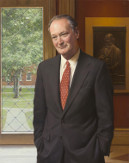Barry Mills (2001–2015)

Barry Mills served as the fourteenth president of Bowdoin College (2001–2015). He was inaugurated in October 2001 as the College was beginning its 200th academic year.
During his tenure, Mills underscored the primacy of Bowdoin’s academic program and worked with the faculty to redefine a liberal arts education for the twenty-first century. Under his leadership, the College also successfully recommitted itself to the goal of expanding ethnic, religious, and socioeconomic diversity among students and employees.
Improved opportunity and access to Bowdoin was a constant priority of the Mills administration. Mills repeatedly declared financial aid fundraising to be the single most important initiative at the College. In 2008 the College announced the replacement of student loans with grants for all students receiving financial aid, beginning with the 2008-09 academic year.
Mills also initiated a comprehensive campus master planning study to guide future development on the campus. He worked to bolster the humanities and to strengthen and increase support for the arts at the College, completing a major expansion and renovation of the Bowdoin College Museum of Art; a conversion of the Curtis Pool building into the Studzinski Recital Hall and 280-seat Kanbar Auditorium; and a complete renovation of the former Longfellow Elementary School into the new Edwards Center for Art and Dance.
Student residential life was also been improved during the Mills presidency through the construction of new residence halls and the renovation of existing residential facilities. The Peter Buck Center for Health and Fitness and the Sidney J. Watson Ice Arena both opened during the Mills presidency, and the College also established the Joseph McKeen Center for the Common Good.
Bowdoin’s endowment — of which nearly half is restricted to support for financial aid — continued to grow during Mills’s tenure, surpassing the $1 billion mark for the first time in June 2013 and reaching $1.4 billion by the time Mills stepped down in June 2015. Mills successfully led “The Bowdoin Campaign,” a five-year fundraising effort that concluded in June 2009. The campaign, which exceeded its goal of $250 million, enhanced Bowdoin's academic program by adding faculty and by focusing resources on the faculty/student experience, faculty scholarship, and the intellectual life of the College. The College also acquired significant additional space for the future during the Mills presidency, adding 175 acres of developable land following the closure of the nearby Brunswick Naval Air Station.
Mills, who earned a PhD in biology at Syracuse University and a law degree at Columbia University, where he was a Harlan Fiske Tone Scholar, previously served as the deputy presiding partner of Debevoise & Plimpton in New York City, one of the nation's preeminent international law firms. He joined the firm in 1979 and became a partner in 1986.
Born in Providence, RI, Mills graduated in 1968 from Pilgrim High School in Warwick, RI. A dean's list student at Bowdoin, Mills graduated cum laude in 1972 with a double major in biochemistry and government. He earned his doctorate in biology in 1976 at Syracuse University.
Mills’s wife, Karen Gordon Mills, served as the administrator of the Small Business Administration (SBA) in the Obama Administration. Their three sons—William, Henry, and George—all graduated from Brunswick High School.
Mills was a member of the Bowdoin College Board of Trustees from 1994 until 2000. In March 2017, he was named deputy chancellor and chief operating officer at the University of Massachusetts Boston. Four months later, he was named interim chancellor at the school, a post he held until stepping down in the summer of 2018.
Painting credit: Bowdoin College Museum of Art, Brunswick, Maine Commissioned by Bowdoin College; Transferred to Museum Collection, 2016